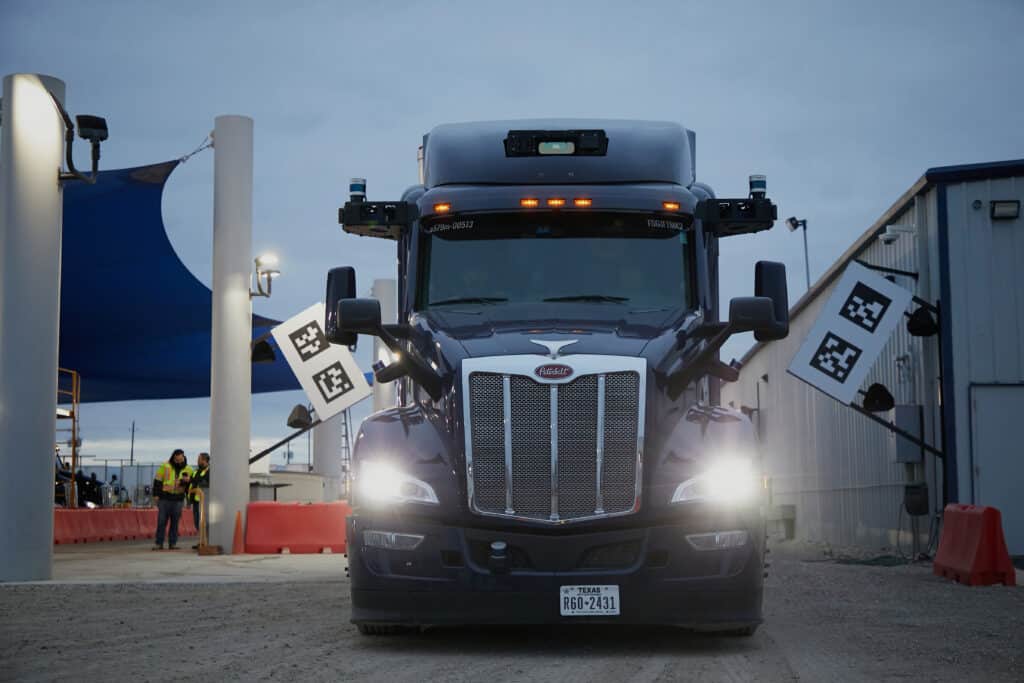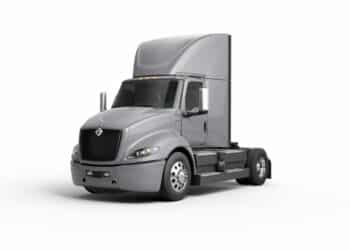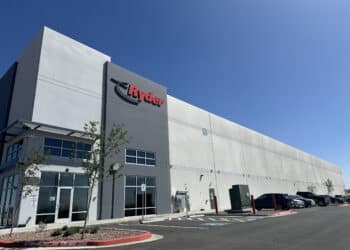The autonomous truck market is building momentum as major players ramp up testing and form partnerships, but financing models and pricing have yet to be established.
Kodiak Robotics, an autonomous trucking technology provider, is going public through an agreement with special purpose acquisition company Ares Acquisition that places the Mountain View, Calif.-based firm’s pre-money valuation at $2.5 billion, according to an April 14 release by Kodiak. The company estimates the total addressable market for autonomous trucking to be more than $4 trillion.
Aurora, another leader in the market, expects to deploy 10 driverless trucks between Houston and Dallas in the first half of the year and has been working with Texas legislators to share safety updates and gather feedback, according to a March 31 company release. The Pittsburgh-based company has also been working with U.S. Customs and Border Protection to develop training programs and signage to help autonomous trucks comply with mandatory inspections.

The autonomous truck market is advancing “faster than you think” as commercial vehicle OEMs partner with autonomous systems providers, Jennifer Costabile, general director of marketing and sales enablement at GM Envolve, said during the recent Commercial Vehicle Business Summit.
“We’re using that technology [from providers] to help us push and move faster to build it into vehicles that GM produces and sells to retail and commercial customers,” she said.
To support the autonomous vehicle initiative, General Motors acquired autonomous technology company Cruise in February, according to a release. Volvo AB also announced a partnership with tech startup Waabi Innovation in February to accelerate autonomous truck testing and development.
Improving efficiency
In addition to addressing industry challenges such as driver shortages and high labor costs, autonomous trucking can significantly reduce operating costs by improving efficiency, Ann Rundle, vice president of electrification and autonomy at ACT Research, told Equipment Finance News.
“When you have a computer driving it, you are going to be driving that vehicle most very, very efficiently.”
— Ann Rundle, ACT Research
“So, you will actually get an improvement on your fuel economy, some claiming 10%. … because it’s going to be very moderated — no sudden speeding up, no slowing down,” she said.
Autonomous trucks will also allow fleet companies to fully utilize an asset that “otherwise has hours of service restrictions,” Lydia Vieth, a research analyst focusing on autonomy and electrification at ACT Research, told EFN.
For instance, the Federal Motor Carrier Safety Administration rules allow drivers to drive up to 11 hours after 10 consecutive hours off duty. Drivers are also required to take a 30-minute break after eight cumulative hours without at least one 30-minute interruption.
ACT Research is putting together a model to calculate total cost of ownership and should have a better idea later this year, Vieth said.

Financing rests on testing, pricing rollout
Lenders may be reluctant to finance autonomous vehicles due to unproven economics and lack of an aftermarket in this new sector, a Commercial Credit Group spokesperson previously told EFN.
One challenge facing this financing segment is that lenders still need upfront pricing numbers to be established, Vieth said.
“I don’t know that there’s a big enough market where we would have any sort of info on that at this point,” Vieth said. “It’s not like these are just open to the broad public. Right now, the autonomy companies are still working in partnership with those fleets who do want to try it out and then learn.”
Until pricing and return on investment data get fleshed out, autonomous companies will likely continue to lease trucks to fleet companies so those companies understand the value proposition when they are ready to purchase, ACT’s Rundle said. Thorough testing and data collection by the fleets should bolster the financing landscape, she said.
“From a financing perspective, if I’m going to Mitsubishi [HC Capital], or BMO or whatever, as the fleet, I’m going to be able to really say, this is the data, here’s my payback, and probably not have an issue,” she said.
The third annual Equipment Finance Connect at the JW Marriott Nashville in Nashville, Tenn., on May 14-15, 2025, is the only event that brings together equipment dealers and lenders to share insights, attend discussions on crucial industry topics and network with peers. Learn more about the event and register here.









